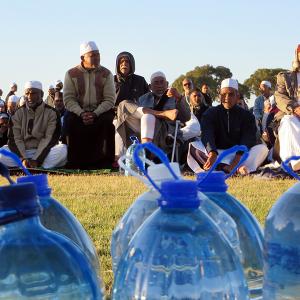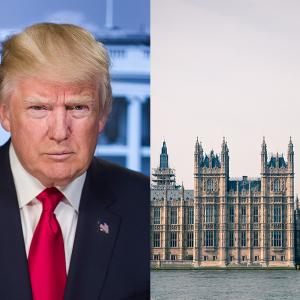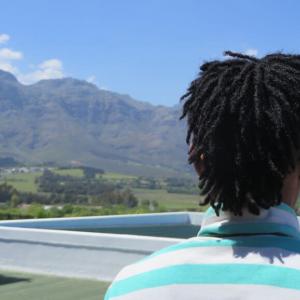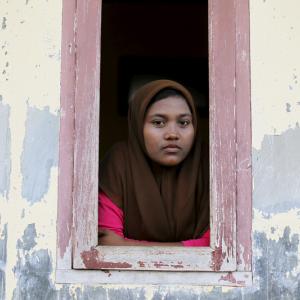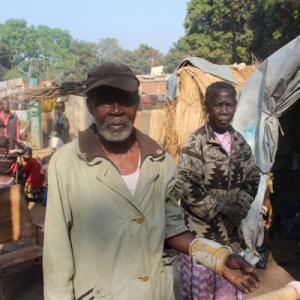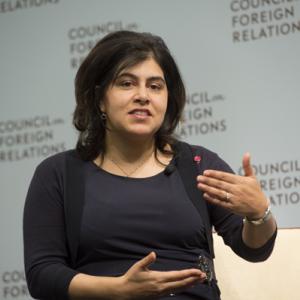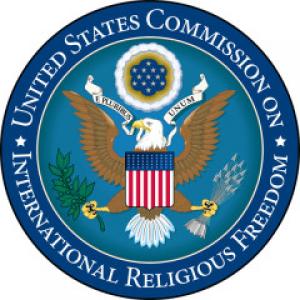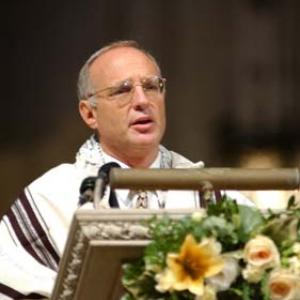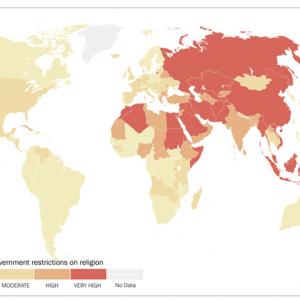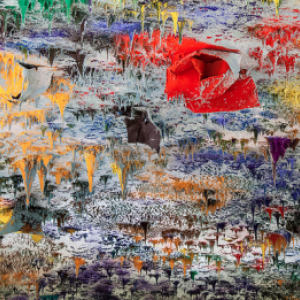Brian Pellot writes for Religion News Service.
Posts By This Author
As Cape Town’s Water Crisis Nears ‘Day Zero,’ Faith Groups Spring into Action
Government officials have provided scant details for Day Zero logistics. Rather than communicate a clear plan of action, some are invoking fear with comparisons to World War II and 9/11.
U.K. Debates Banning the Phrase ‘Honor Killings’
“Language matters. The use of the term ‘honour’ to describe a violent criminal act … can be explained only as a means of self-justification for the perpetrator. It diminishes the victim and provides a convenient excuse for what in our society we should accurately and simply call murder, rape, abuse, or enslavement,” Ghani said when introducing her crime-against-women bill Jan. 31.
Queer Muslims Find Solace and Solidarity in Cape Town
Amazigh was one of 125 queer Muslim activists and allies who came together for The Inner Circle’s seven-day Annual International Retreat, from Oct. 14 to Oct. 21, in South Africa. The gathering focused on “building a movement towards an all-inclusive and compassion-centered Islam,” a mammoth task for attendees like Amazigh who live in countries where homosexuality and transgender expression are often taboo and criminalized.
How #ThisFlag Pastor Evan Mawarire Used Facebook to Shut Down Zimbabwe
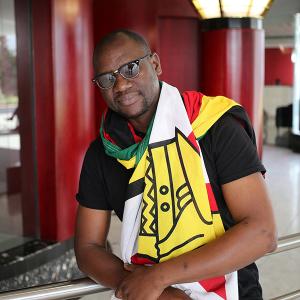
Evan Mawarire. Image via REUTERS/Siphiwe Sibeko/RNS
Leaning over his desk in Harare, the Zimbabwe flag’s green, red, yellow, and black stripes draped around his neck, Pastor Evan Mawarire looked into the camera and launched an uprising.
“This flag, every day that it flies, is begging for you to get involved, is begging for you to say something, is begging for you to cry out,” he told fellow Zimbabweans in the April 20 video.
Safe House in South Africa Offers Gays Refuge, Hope, and Ministry
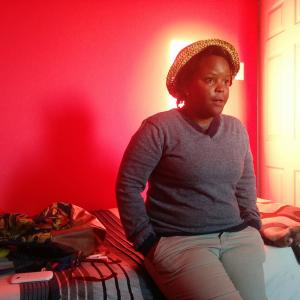
Hlubi George. Image via Brian Pellot / RNS
Sipping ginger beer at an outdoor restaurant in Gugulethu, one of South Africa’s murder hubs, Prince January said he feels safe.
Across the train tracks at their shared home in Manenberg, Hlubi George said she can finally sleep through the night.
January, who is gay, and George, who is lesbian, are both temporary residents at Inclusive and Affirming Ministries’ iThemba Lam LGBTI safe house on the outskirts of Cape Town. The two-bedroom center provides refuge and counseling for at-risk sexual minorities from across the continent and a safe space for residents to integrate “God’s gift of faith with God’s gift of sexuality.”
Interfaith Leaders Find Common Ground Promoting Internet Freedom

Photo via Sergey Nivens / RNS
“If you want a world where #BlackLivesMatter … if you want dignity for #Sikhs and #Muslims and the #99Percent, then #NetNeutrality is your cause too.”
So says Valarie Kaur, an American Sikh lawyer and filmmaker who thinks these popular hashtags are more than just clickbait: they represent the most pressing social justice issues of our time.
Interfaith leaders have long rallied for racial and economic justice and railed against police brutality. Now, with her Faithful Internet campaign, Kaur is calling on America’s religious communities to fight just as hard for net neutrality.
Let Cecil the Lion’s Death Shine Light on Zimbabwe’s Human Rights Abuses
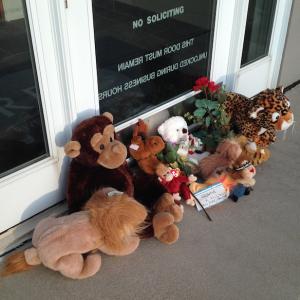
Stuffed animals left by protesters block the doorway of River Bluff Dental clinic in Bloomington, Minn., after the killing of a famous lion in Zimbabwe, July 28, 2015. Photo via REUTERS / David Bailey / RNS
When a lion killed an American woman last month in South Africa, where I now live, the story made a few headlines, but the Internet did not melt. Perhaps Americans assume “lion bites woman” is the African equivalent of “dog bites man” — too ordinary to merit mention.
But when man bites dog, or when man shoots lion with an arrow, Americans conjure up images of Simba and Mufasa, the only reference many have to a continent of 1.1 billion people three times the size of their own country, and they lose their proverbial scat.
Assuming Zimbabwe won’t make the news again until dictator Robert Mugabe finally dies, allow me to capitalize on Cecil’s demise with a quick rundown of the country’s atrocious human rights record.
Who Are the Rohingyas and Why Are They Fleeing Myanmar?
Hundreds of thousands of Rohingya Muslims live in squalor in Myanmar’s western Rakhine State. That number has been falling fast as thousands flee by land and sea in search of better lives and basic survival. Here’s a look at who the Rohingyas are and why they’re leaving Myanmar in droves.
5 Takeaways from the New Report by U.S. Commission on International Religious Freedom
Despite much gloom and doom, there were a few silver linings in the report. Religious freedom and harmony have improved in Cyprus, resulting in greater access to houses of worship across the Green Line separating north from south. Nigeria witnessed its first peaceful democratic transfer of power earlier this year when Muslim northerner Muhammadu Buhari ousted Christian southerner Jonathan Goodluck at the polls. And Sri Lanka’s new government has taken positive steps to promote religious freedom and unity in the face of violent Buddhist nationalism.
Sayeeda Warsi, First Muslim in British Cabinet, Resigns Over 'Indefensible' Gaza Policy
The first Muslim to serve in a British Cabinet resigned Tuesday over her government’s “morally indefensible” policies in Gaza and its role in the Middle East peace process.
Baroness Sayeeda Warsi, who served as senior Foreign Office minister for faith and communities, announced her decision on Twitter, saying: “With deep regret I have this morning written to the Prime Minister & tendered my resignation. I can no longer support Govt policy on #Gaza.”
In her resignation letter, Warsi wrote: “I believe our approach in relation to the current conflict is neither consistent with our values, specifically our commitment to the rule of law and our long history of support for International Justice.”
Labour leaders and human rights groups have criticized Britain’s Conservative government, led by Prime Minister David Cameron, in recent weeks for not unequivocally condemning Israel’s handling of the Gaza crisis.
Conservative leaders expressed disappointment over Warsi’s “unnecessary” resignation on Tuesday, while Labour opposition leader Ed Miliband said Warsi had acted with “principle and integrity” in deciding to step down.
State Dept. Should Act on Pakistan's Religious Freedom Violations, Watchdog Group Says
An independent religious freedom watchdog panel has welcomed the State Department’s annual religious freedom report and its list of the world’s worst offenders, which had laid dormant for three years.
The list of “countries of particular concern” had remained unchanged since 2006 — and hasn’t been formally issued by the State Department since 2011 — when Burma, China, Eritrea, Iran, North Korea, Saudi Arabia, Sudan and Uzbekistan were cited.
In April, the U.S. Commission on International Religious Freedom recommended that the list be doubled to include Turkmenistan, Tajikistan, Vietnam, Pakistan, Syria, Iraq, Nigeria, and Egypt. Turkmenistan was the only new addition to this year’s CPC list, bringing the total to nine countries.
The State Department and the independent USCIRF have often been at odds on who makes the list of worst offenders, and in a statement, USCIRF noted the “disappointing omission” of Pakistan in particular.
“Pakistan represents the worst situation in the world for religious freedom for countries not currently designated by the U.S. government as CPCs,” said USCIRF Chair Katrina Lantos Swett.
Rabbi David Saperstein Tapped as First Non-Christian to Serve as U.S. Ambassador for Religious Freedom
President Obama on Monday said he plans to tap Rabbi David Saperstein as the next ambassador-at-large for international religious freedom, the first non-Christian to hold the job, which was created in 1998.
As ambassador, the man named as the most influential rabbi in America by Newsweek magazine in 2009, will head the State Department’s Office of International Religious Freedom, and will be tasked with monitoring religious freedom abuses around the world.
“When it comes to the work of protecting religious freedom, it is safe to say that David Saperstein represents the gold standard,” said Secretary of State John Kerry, announcing the nomination at the State Department.
A Reform rabbi and lawyer, Saperstein, 66, has led the Religious Action Center of Reform Judaism for 40 years, and has spent his career in Washington, focusing on social justice and religious freedom issues. He was instrumental in the 1993 passage of the Religious Freedom Restoration Act, which requires the government to show a compelling reason for any action that impinges upon the exercise of religion.
At Angelina Jolie-Chaired Summit, Faith Leaders Work to End Sexual Violence
Religious leaders from across Africa and England came together Wednesday to discuss the role clergy should play in preventing and responding to sexual violence.
The panel was part of the three-day Global Summit to End Sexual Violence in Conflict co-chaired by Angelina Jolie, the special envoy for the U.N. high commissioner for refugees. Jolie made an unannounced appearance before the event, causing attendance to surge and preventing several dozen participants from entering the crowded conference room.
In a pre-recorded video message, Archbishop of Canterbury Justin Welby started the session by describing some of the positive developments he observed firsthand on a recent trip to the Democratic Republic of Congo.
“Historically there has been a culture of impunity,” he said. “Faith leaders are challenging that culture fiercely and saying that rape and sexual violence in war is absolutely unacceptable and will result in consequences.”
5.3 Billion People Face Harsh Religious Freedom Restrictions
Global religious hostilities reached a six-year high in 2012 and affected more people than government curbs on religious freedom, according to the Pew Research Center’s latest report on religious restrictions around the world.
The report, released Tuesday ahead of National Religious Freedom Day on Thursday, shows that 74 percent of the world’s population experienced high levels of social hostility toward religion, up from 52 percent in 2011.
The sharp rise is due to hostilities in China, which for the first time in the survey’s six-year history, scored a “high” level of religious strife. Home to more than 1.3 billion people, China experienced an increase in religion-related terrorism, mob violence and sectarian conflict in 2012.
The greatest levels of social hostilities toward religion were felt in Pakistan, Afghanistan, India, Somalia, Israel, and Iraq, according to the report.
8 Countries on UN Human Rights Council Restrict Religious Freedom
LONDON — Eight of the 47 countries that hold seats on the United Nations Human Rights Council imprisoned people in 2013 under laws that restrict religious freedom, according to a new report from Human Rights Without Frontiers International, a nonprofit advocacy organization based in Belgium.
The eight UNHRC member states on the group’s second annual World Freedom of Religion or Belief Prisoners List, released Monday, are Morocco, China, and Saudi Arabia (whose new three-year terms begin Wednesday), and current members India, Indonesia, Kazakhstan, Libya, and South Korea.
Hundreds of believers and atheists were imprisoned in these and 16 other countries for exercising religious freedom or freedom of expression rights related to religious issues, according to the report. These rights include the freedom to change religions, share beliefs, object to military service on conscientious grounds, worship, assemble, and associate freely. Violations related to religious defamation and blasphemy are also included in the report.
